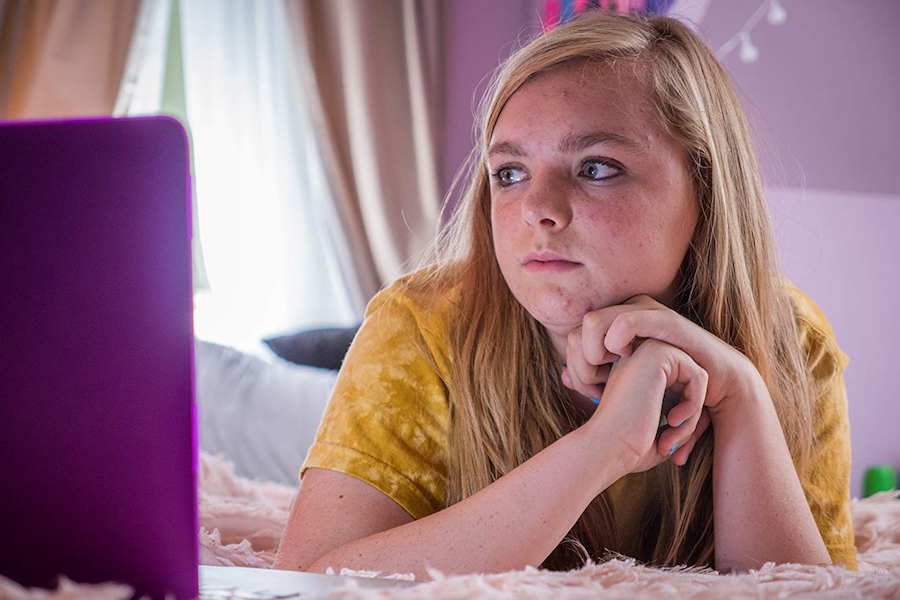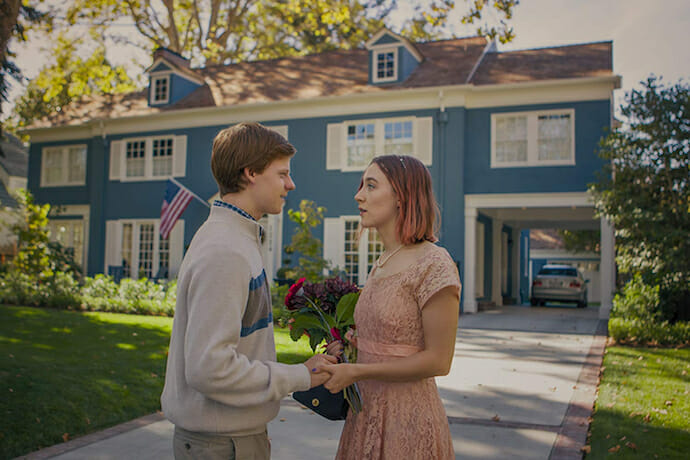
The Death of Schmaltz and Sex Romps: ‘Eighth Grade’ and the YA Film Renaissance
One of the best moments in Bo Burnham’s film, Eighth Grade, is when Kayla (Elsie Fisher) scrolls on her phone, assaulted with Instagram, Snapchat and other modern apps as Enya’s “Orinoco Flow” plays. The scene, brief enough as it is and appearing pretty early in the movie, could not help but strike me as reminiscent of some of the zeitgeist-catching ennui on display in the Mike Nichols classic, The Graduate. Much like how Benjamin’s (Dustin Hoffman) dazed, over-it-all malaise is perfectly put to the various Simon & Garfunkel songs, Burnham’s song choice and direction says much despite the limited action of the scene itself. The implication, that social media makes it easy (and perhaps in the life of a middle-schooler, necessary) to “sail away,” is a profound one. But yet, it is the kind of message I’m used to seeing in a wave of new, critically acclaimed movies focused on young people and growing up.
To start with, Eighth Grade itself is simply astounding, capturing simple truths and universal awkward experiences in such a meaningful way that it can’t help but already stand out as one of the year’s best films. Elsie Fisher, in particular, deserves kudos for making Kayla such a three-dimensional, sympathetic character. Whatever the strengths of Burnham’s script and direction are, they are amplified by Fisher’s devotion to the role and genuine presence as an actor. The film, aided by Fisher’s performance, is sublime in its simplicity and able to capture something about the reality of being in middle school in a way that few other films have even attempted to do.
Eighth Grade is a movie about the here and now. Bo Burnham states this through his decision to have the protagonist be a girl and have social media, particularly YouTube, where Kayla has her own channel of inspirational videos, be such a major crux of the film: “I watched hundreds of videos of kids online talking about themselves. The boys talked about Minecraft, the girls talked about their souls. Slightly more interesting from the girls’ perspective…The girls run a bit deeper at that age.”
Because Burnham understands the issues of what contemporary middle-schoolers are talking about and how they choose to say it, the film is ambitious, unique, and unflinching in its portrayal of coming-of-age in America in the year 2018. Burnham doesn’t shy away from uncomfortable truths or sugarcoat anything by putting in a tacked-on romance, for example. Burnham has said that the film was cathartic in terms of being an outlet to talk about his anxiety, but in so doing he has captured something universal about the anxiety of being a tween or teen.
While Eighth Grade is certainly the latest film to capture genuine adolescent experiences on film, it certainly finds itself in ever-increasing company. “YA literature” has been dominating much of the cultural dialogue in terms of analyses of what kinds of entertainment young people actually consume. However, I would argue that within the past half-decade, there has been a quiet revolution afoot in film meant to counter some of the problematic depictions of adolescence that have become the tropes and standards associated with the genre.
These depictions are more honest, more brutal and generally less schmaltzy. They aim for a verisimilitude seldom seen in the genre, no matter the medium. They are truly “coming-of-age” movies and feel true-to-life. Long gone are the days of John Hughes (and while The Breakfast Club might deserve kudos for being relatively realistic, Ferris Bueller, in contrast, most certainly does not). After the success of American Pie, it seemed like a lot of teen films took a step backwards, becoming more akin to Porky’s than Breakfast Club. (Superbad, in particular, is guilty of this. It’s only been 10 years since that movie, but that film’s message and ultimate raison d’être makes it feel like it has aged 30.) The one exception was television, where occasionally shows like Freaks & Geeks depicted a more realistic high-school setting, but fizzled out too quickly to leave much of an impact. But in this YA-film renaissance, new directors with interesting visions help capture something we haven’t typically seen before. Movies like these serve as an antidote to a world more used to reading or watching melodramatic or sappy YA content similar to the books of, say, John Green, as well as their subsequent film adaptations. Burnham seemingly threw some shade at Green in a recent interview, where Burnham suggested that “a lot of these movies about dying or ‘I love you, but I have lupus’ or whatever…they have to be so big to make the emotions of a kid feel true.” I personally have no love for Green, and find criticisms like Burnham’s not just warranted, but necessary.
Besides Eighth Grade, the real standouts of this movement would include Richard Linklater’s Boyhood (2014), Barry Jenkins’ Moonlight (2016), and Greta Gerwig’s Lady Bird (2017). These films, like Eighth Grade, seem more concerned with being true-to-life and telling honest, unique stories about what coming-of-age looks, and more importantly, feels like. In the case of both Moonlight and Lady Bird in particular, they are highlighting experiences of people and characters not traditionally found on the screen.
Boyhood is the most ambitious out of the bunch, shot over the course of 12 years as its young star, Ellar Coltrane, aged in real-time. Boyhood feels like perhaps a more complete vision than Eighth Grade does, but it also has the aspect of essentially being a period piece whereas Eighth Grade can comment on the here and now of 2018 specifically (which is, admittedly, one of Eighth Grade’s charms). What both Boyhood and Eighth Grade have in common is that they are both unflinchingly real and raw, and have a sense of cinema vérité despite their obviously fictional characters and story. Both of them seek to uncover truths, as nasty or as uncomfortable as they may be, about adolescence and everything that comes with it. In particular, a scene where Kayla Googles how to give oral sex reminds me of a scene where Mason (Coltrane) and a friend ogle models in a Victoria’s Secret catalogue. It isn’t meant to be a set-up for a big, bombastic sex joke, but rather small indications of a young person’s sexual awakening. Boyhood is easily one of my favorite movies of the past few years, and I’m glad Burnham channeled a lot of what makes that movie work so well into Eighth Grade.
The most critically lauded of the bunch is Moonlight, which famously won Best Picture in the most confusing 5 minutes in Oscar history. Taken on its own, Moonlight too is a strong depiction of adolescence, interested in portraying something deep, different and profound. The film focuses on three different episodes in the life of Chiron, a young, gay African-American boy living in Miami with his drug-addled mother (Naomie Harris). The first part deals with his childhood, the second his adolescence, and the third his adulthood, as he meets up with the lost love from his youth. Similar to Boyhood, we can understand and sympathize with him better. Kudos must be given to writer/director Barry Jenkins and co-writer Tarell Alvin McCraney for realizing that understanding the young background of a character gives them more development, and thus more of a context for them to thrive. Moonlight also captures something genuine about bullying, the peer pressure that goes into it, and the anger Chiron feels because of his disaffected place in the world making him a target. Eighth Grade, by featuring the popular girl that Kayla is constantly trying to impress and whom Kayla later rebukes (in what is one of my favorite sequences from the movie), also portrays social tension in a realistic way. I don’t think that Eighth Grade is necessarily aiming for the artistic heights or social meaning that Moonlight is aiming for, but both films channel uncertainty, awkwardness, and yes, even anger in ways that seem elevated far beyond where other depictions of adolescence are.

The most recent of the three, Lady Bird, has a similar theme to Eighth Grade in that both their main characters try to balance acceptance with their own unique individuality. The title character of Lady Bird (Saoirse Ronan) is also trying to fit in, but assert her own identity, so much so that she sheds her given name Christine to become “Lady Bird.” I really like the depiction of adolescent friendship in Lady Bird, as portrayed by Lady Bird and her friend Julie (Beanie Feldstein). Lady Bird and Julie call each other out when appropriate, but ultimately are incredibly loyal to one another. Finally, both films have an interesting child-parent relationship. In Lady Bird, Lady Bird’s beleaguered, overburdened mother Marion (Laurie Metcalf) is a source of a lot of contention, until Lady Bird’s ending epiphany about her relationship with her mom. Likewise, Kayla’s dad Mark (Josh Hamilton) initially bugs Kayla in a way similar to how the Marion/Lady Bird relationship works. We understand the parent desperate to become involved in their child’s life, and can empathize with him, as well as sympathize with Kayla’s consternation (she is a teenager, after all). When Kayla and Mark share an emotional confession by a campfire, it feels genuine, not pandering. Both Lady Bird and Eighth Grade are very true to the people and relationships that they want to portray.
Other recent examples I’ve enjoyed include James Ponsoldt’s The Spectacular Now (2013), Rick Famuyiwa’s Dope (2015), and Kelly Fremon Craig’s The Edge of Seventeen (2016). While perhaps not of the same caliber as the other three, each, like Eighth Grade, is interested in a type of character or relationship that isn’t what we’re typically used to seeing. Dope, which had a tagline of “It’s Hard Out Here for a Geek,” deals with Malcolm (Shameik Moore), an inner-city African American teen who is trying to balance his more nerdy tendencies and desire to go to Harvard with a Big Lebowski-esque case of mistaken identity that has him, like The Dude, in way over his head in a competitive crime row. The Edge of Seventeen focuses on Nadine (Hailee Steinfeld), who, like Kayla in Eighth Grade, is always on the periphery of popularity. Because Nadine is older, the filmmakers can have her be moodier and generally more cynical than Kayla is. And while it is interested in spotlighting a relationship rather than an individual, The Spectacular Now is a very honest portrayal of first love, warts, drama and all, in no small reason due to the chemistry between a young, pre-Whiplash Miles Teller and a young, pre-whatever-YA-adaptation-she’s-in-this-week Shailene Woodley. The film serves as a counter to Nicholas Sparks, John Green, and other sappy teen romances in that it does portray young love as precious, but also nerve-wracking and complicated.
An honorable mention also deserves to go to Lucas Hedges’ performance in Manchester by the Sea. Hedges has already appeared in some of the most acclaimed movies in recent years (including Moonrise Kingdom, Three Billboards outside Ebbing, Missouri, and hey, look at that, Lady Bird), but it is in Manchester by the Sea that he not only shines the most, but gives energy to a fresh, different kind of young-adult character. His occasionally-tense relationship with his uncle (Casey Affleck) is one of my favorite things about the movie. I really like the scene where Hedges has a breakdown while trying to stuff food back into the refrigerator; it seemed very dramatic, but yet also very adolescent. Manchester by the Sea generally reminds me a lot of one of the best filmic portrayals of adolescence, Robert Redford’s Ordinary People (1980). Hedge’s performance in particular serves as a reminder that, even in supporting roles, young adult characters (and performers!) are truly thriving in ways they almost generally never have before.
Why is it that film seems to be where the best YA stories are being told today? I feel like a lot of it is a response to the watered-down YA of recent years. I think it also comes from wanting new or different stories about adolescence to be told, and creating meaningful art to fill that void. Richard Linklater and Barry Jenkins are both accomplished filmmakers, while Bo Burnham and Greta Gerwig are just recently emerging as unique voices in film. The need to tell stories that they themselves would respond is seemingly one of the things that unites them. Greta Gerwig’s adolescent experience probably didn’t 100% resemble Lady Bird’s, and the protagonists’ respective journeys in Eighth Grade or Boyhood seem mostly incomparable to the experiences of their directors, yet they all seem to be guided by a desire to seek truth and do good.
Young people seek content and art that appeals to the world they encounter. As a young person, I was often frustrated by depictions of people my age in movies and TV. I craved something more raw and real from my entertainment. A lot of my early attempts at creative writing were my experiments with telling the kinds of stories I wanted to see. It gives me tremendous satisfaction to know that this up-and-coming generation will have such an abundance of movies that appeal to them, and speak some kind of truth about their lives. Not everyone can identify with every character or with every movie, but each of the ones I’ve mentioned, including and especially Eighth Grade, contain at least something that speaks both genuinely and universally. I think that will be incredibly important as these films continue to be seen and influence others along the way. Long live the YA film revolution!
